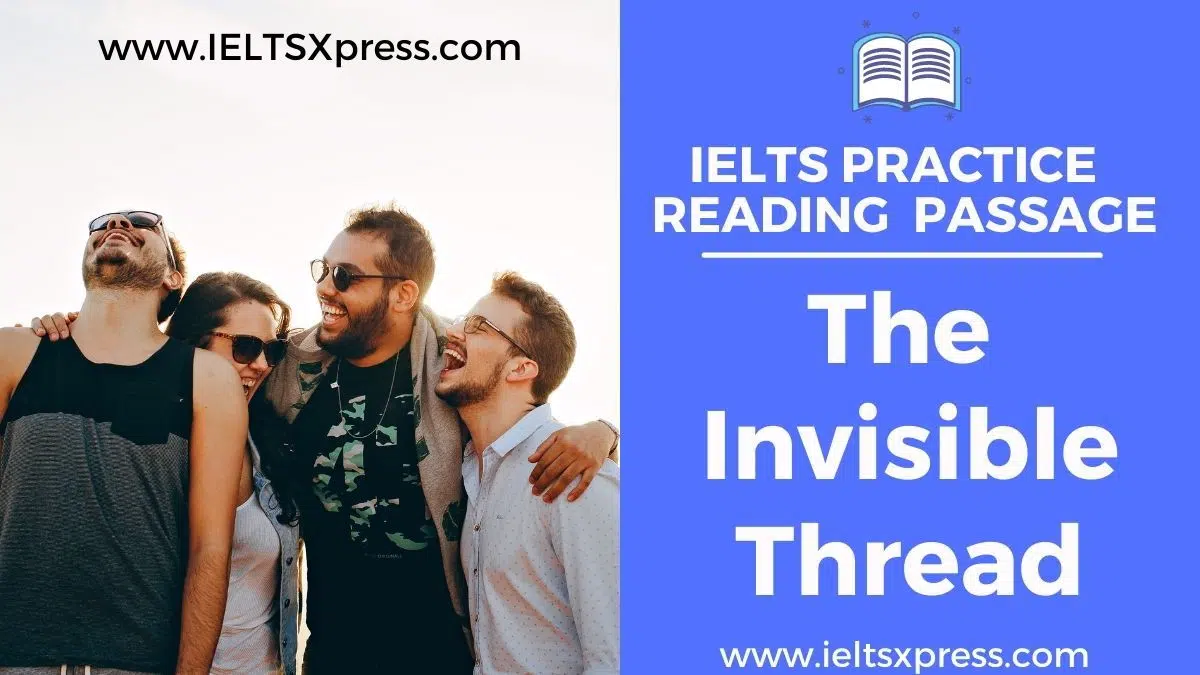The Invisible Thread IELTS Reading Passage with Answers
Reading Passage 3
You should spend about 20 minutes on Questions 28-40 which are based on Reading Passage 2 below.
The Invisible Thread
A.
It lifts hearts and lengthens lives. It has been hailed as the ultimate good by philosophers and promoted by major religions. The wondrous good in question is friendship. Aristotle’s highest goal for men and the third plank of the French revolution – liberty, equality, fraternity — friendship is as aid as humanity and as important as love or justice. But while bookshop shelves groan with self-help books on finding the perfect partner and philosophical texts on the nature of freedom, friendship barely gets a mention among academics or policy-makers.
B.
Friendship is the invisible thread running through society, yet its significance in our lives is, if anything, increasing. While the claim that ‘friends are the new family’ is an overstatement, it is certainly the case that friendships figure prominently in both the lives people actually lead and the ones to which they aspire. Television programmes such as Friends portray a world in which close friendships define the contours of the participants’ lives: parents and children are allowed, at best, walk-on parts.
C.
One of the reasons why thinkers struggle to recognize this trend may be one of definition. After all, I am a friend to someone I have known and loved for twenty-five years, but I am also a “Friend of The Earth’. Friendship is a slippery category. This, however, is where philosophers are supposed to help. Aristotle divided friendships into three types: friendships for usefulness, friendships for pleasure, and friendships of virtue.
D.
The first kind of friend is the one who will get you a job or membership of an exclusive club; the second makes you laugh. But in both cases, the point of the friendship is that they provide something of separate value to you. True friendship, the third kind, is valued for itself. There are few numerical limits on the first two kinds — I can have a vast business network and hundreds of agreeable acquaintances — but true friendship is, by definition, a limited field: if someone has many friends, they have none.
E.
Virtuous+ friendship is long-term and committed and brings great psychological benefits, and there is plentiful research evidence showing that having at least one close friend is associated with a range of health benefits, from recovery times from cardiac illness to reduced incidence of mental health problems.
F.
However, friendship is not always an unalloyed good. Its benefits are unevenly spread and its impact on traditional liberal values, such as equality, diversity and mobility, is mixed. The first problem is that men are worse at friendship than women. It is now widely acknowledged that women do more of the “social’ work than men and have better-developed friendship skills, which leaves men at a disadvantage.
G.
Secondly, friendship has political downsides for governments committed to social inclusion: it is, by definition, exclusi+ve. People from a particular social class or educational background are highly likely to form friendships, or romantic relationships, with people from the same background. Given that friends help each other, the danger is that the friendships of the affluent and successful hoard social advantage to the detriment of social mobility.
H.
Friendship is seen — with some justification — as a private matter, but the strong links between friendship and other social goods – including better health, more effective careers, and higher life satisfaction — should be enough to merit greater attention from decision makers. So what are the political implications of these observations? Perhaps the best politicians can aim for is not to make things worse for friendship. But political institutions can improve or worsen the conditions in which friendships are formed.
I.
First of all, the issue of time needs to be considered. Friendship requires time to flourish.Aristotle reckoned one and a half bushels of salt needed to be consumed together before a friendship became solid. At the present time, many people r+egard non-working hours as family time, but little allowance is made for the time needed to build friendships. Ironically, for politicians to discourage people from working long hours could be counter-productive, since a third of us make most of our friends through work. What the decision-makers could do, however, is discourage the drive for commercial gain that squeezes conviviality out of the workplace. IELTSXpress
J.
There is+ also a case for encouraging spaces in which people from different backgrounds meet and interact in order to increase the chances of cross-class friendships. Given the increase in geographical inequality, with rich people increasingly living in neighbourhoods of rich people, only hospital wards and places of religious worship are sites of genuine social mixing.
K.
Friendsh+ip is a virtue with some of the appearances of a social vice. It can promote or demote social mobility; underpin tolerance or bolster discrimination; erode or sustain hierarchies. Society could be composed of strong friendships between people of identical social backgrounds who treat everyone else with contempt, intolerance or fear. The true test of the friendliness of a community is not simply the way its citizens treat their friends, but whether they behave generously towards the broader social world. We need not only the care of friends but the kindness of strangers.
Questions 28-33
Which paragraphs A—K of the article contain the following information?
28. the effect of gender on people’s ability to make friends
29. friendship: a frequently disregarded influence for good
30. the difficulty of defining friendship
31. the distinction between a real friend and other kinds of friends
32. the similarities between people who are close friends
33. people’s need for friends as well as family
Questions 34-40
Do the following statements agree with the views of the writer of the article? Write
YES if the statement agrees with the views of the writer
NO if the statement contradicts the views of the writer
NOT GIVEN if it is impossible to say what the writer thinks about this.
34. Friendship has become less important in people’s lives.
35. it is impossible for anyone to have a large number of genuine friends.
36. Having a genuine friend improves a person’s life in a variety of ways.
37. Wealthy people find it more difficult to form close friendships.
38. Politicians cannot influence people’s chances of making friends.
39. Reducing the number of hours people spend at work would help people to form friendships.
40. It is difficult for people who do not live close to each other to be good friends.
The Invisible Thread IELTS Reading Passage Answers
Practice with Expert IELTS Tutors Online
Apply Code "IELTSXPRESS20" To Get 20% off on IELTS Mock Test
28. F
29. A
30. C
31. D
32. G
33. B
34. NO
35. YES
36. YES
37. NOT GIVEN
38. NO
39. NO
40. NOT GIVEN
Also Check: Keep the Water Away IELTS Reading Passage with Answers




